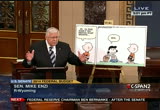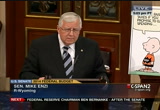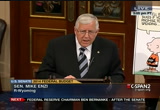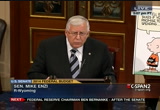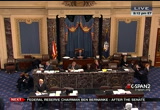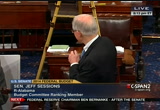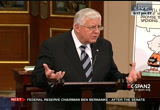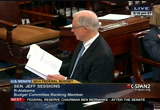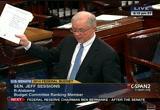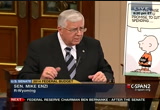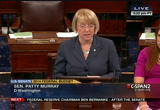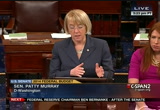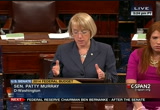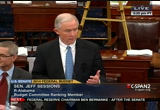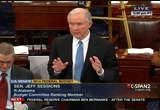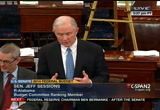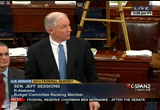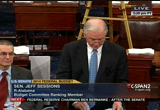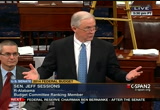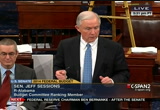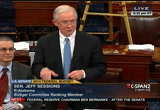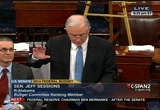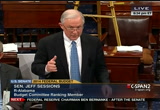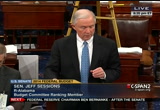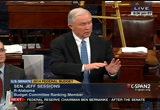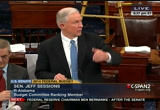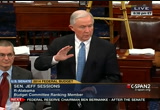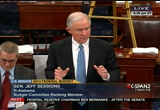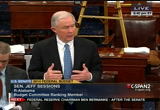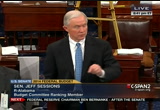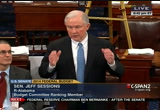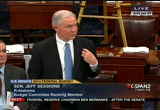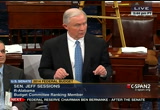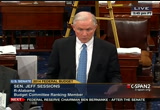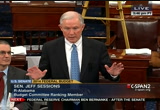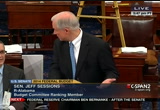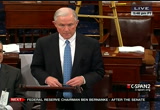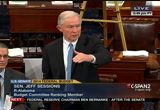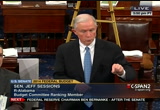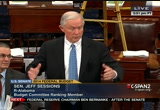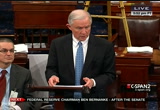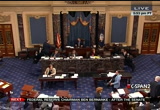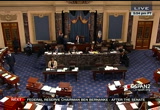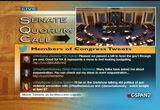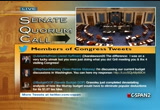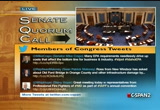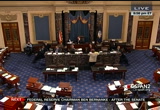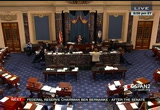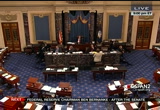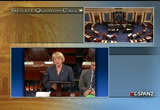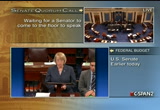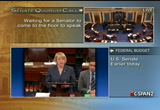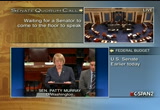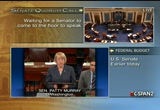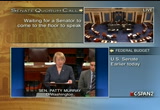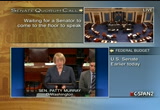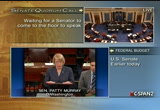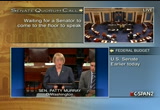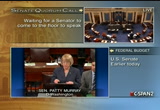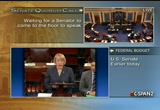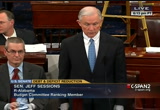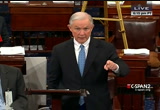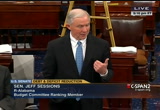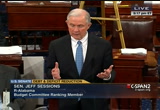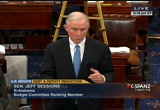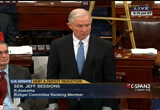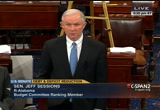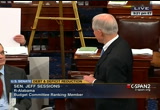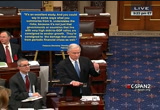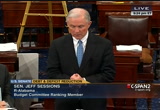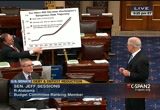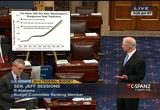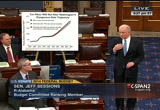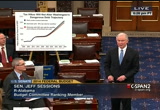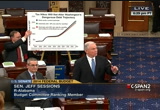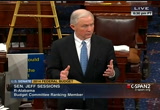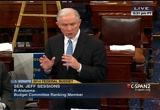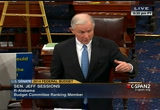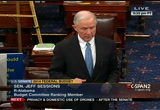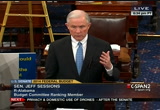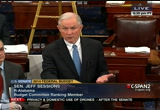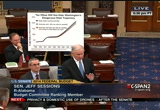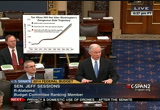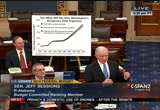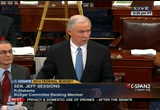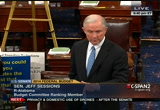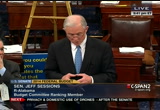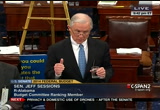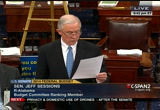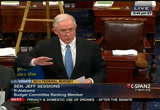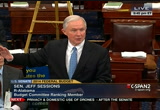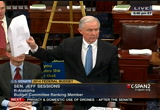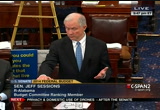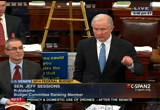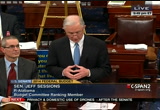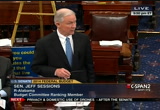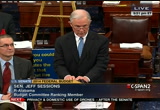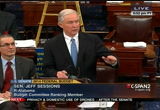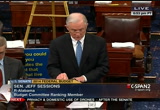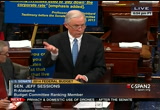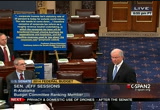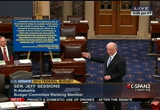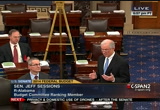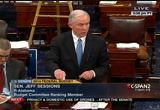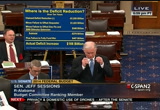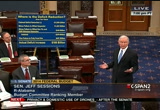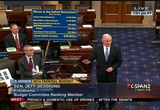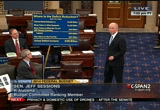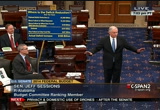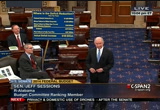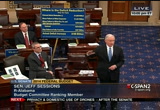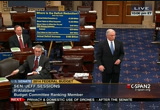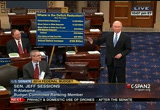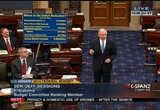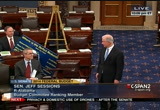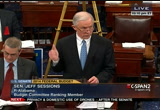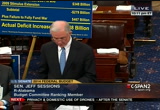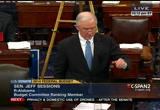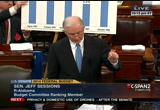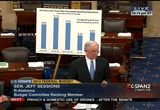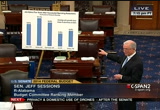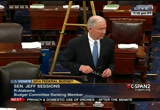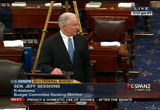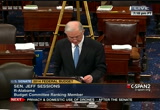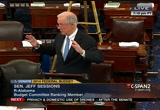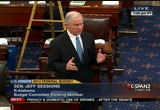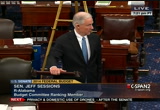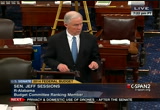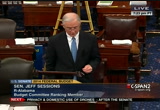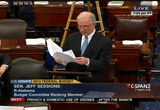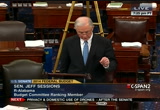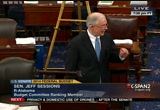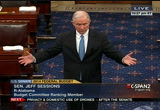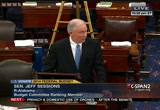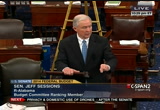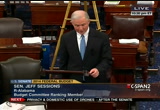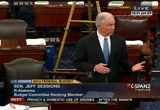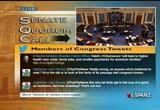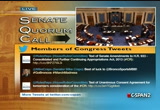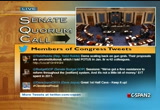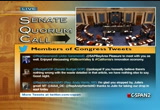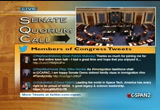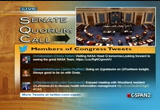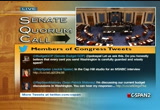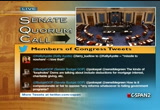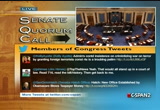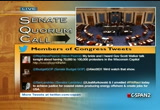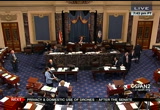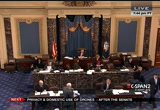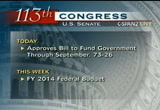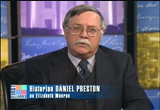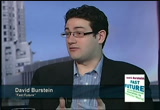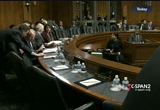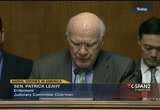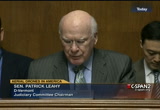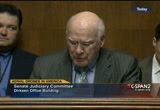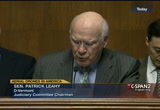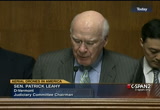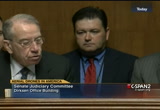tv Tonight From Washington CSPAN March 20, 2013 8:00pm-11:00pm EDT
8:00 pm
keep borrowing $23 trillion, or $16 trillion. that's if we could balance the budget quickly. in fact, the majority wants to set up a fast-track legislative process to get $975 billion from you as quickly as possible. now, we had the discussion earlier about taxes and we thought that we had worked the tax problem for and everybody preserved people's taxes for 99% of the people and we thought that there were going to be some spending cuts coming. somebody sent me this little chart that i have to share. this says "republican" on it. "okay, i'll raise taxes if you promise to cut spending." well, lucy, it's a "deal." but we've been watching this cartoon for years and years and
8:01 pm
we know what happens. when we go to pick up the spending cuts, the football suddenly gets lifted out of the way and we wind up on our back. the american public winds up on its back. that's not the kind of spending cuts we're looking for. we're looking for some real spending cuts. not just a decrease in the growth but some real spending cuts. and there's -- there's a way to do those. wyoming has been faced with probably an 8% in reduction in its income. how did it handle it? the governor, seeing that coming, got ahold of every department and program and said, i need a plan from you for how you would cut 2%, how you would cut 4%, how you would cut 6% and how you would cut 8%. when he got the four plans from every department, he took a look at them to see if they were cutting the worst first, you know, reducing the pain as much as possible. and it worked that way. hardly a whispe whimper, and hay
8:02 pm
anything noticeable to the customers. that's the people that live in wyoming. that's good management. not an e-mail that goes out that says, "make the cut as painful as possible." that's the sequester that we're going through now. that should never happen in any kind of a managed business or a managed government. i guess that would be saying that it's not a managed government. now, when we took up the budget in committee last week, i offered an amendment to strike the language that provided for the fast-track tax increase process. my amendment was meant to ensure that the tax reform would be conducted in a bipartisan manner to generate a more efficient, fairer and simpler tax code and spur economic growth rather than raise revenue through legislation that can be passed with a simple majority here in the senate. a simple majority vote would ensure that the minority party's views would receive little, if any, consideration. we'd have no input. debate time and the number of amendments that could be offered to improve the legislation would
8:03 pm
also be limited. we need to have an open process where all members can have their voices heard. we simply need to stop deal making and start legislating. we've had this system around here for awhile where we work from contribed crises that hav have -- contribed crises that have very specific dates in which the sky falls and the united states is demolished. and, of course, that does generate a lot of publicity in all of the media and everything leading up to that crunch. and a group goes off and makes a deal and we find out about that deal on the last hour. and our choice at that point is take it or leave it. well, if the sky is going to fall and america's going to be destroyed, what's the choice? that's not the way to do it. we've got to quit deal making and start legislating. and the way you legislate is to have the chairman and the ranking member and other interested people on the committee that have a very
8:04 pm
specific interest in an issue sit down together and see if they can't work out a basic package. it only has to be a basic package. it doesn't have to be a comprehensive package. and this basic package would then go to committee. now, that's where the people can turn in amendments and improve it from their viewpoint. the reason we have so many people in the senate and in the house is so that we can see as many unintended consequences as possible. but if it doesn't go through committee, we've turned those people off, we've said, your views don't count, your amendments don't count and consequently we don't wind up with a good piece of legislation coming out of committee. if you get it out of committee in good shape, you can get it to the floor in good shape. and if you get it to the floor in good shape, you can take additional amendments and improve it maybe more. that's been my experience with it. now, yes, there have to be some tough votes with that and that's what we do. that's what we get paid for, legislating, voting.
8:05 pm
now, we spent last week working on a continuing resolution. we got to vote three times. now, there were only requests for 11 more votes. we didn't get to vote on those until tonight so that he had it arranged in a very fast process. and some of the people didn't actually get their say. we've got to stop deal making and start legislating, particularly on big and important issues like tax refo reform. we have to get back to a regular process so all members can give input and improve the legislation. senator gregg and senator wyden worked on income tax for a long time. then senator coats and senator wyden worked on income tax for a long time. now i'm working with senator wyden and senator coats on income taxes. and i think we can come up with something that will work and we can do both the individual and the corporate tax raises at the
8:06 pm
same time, because they're very interrelated. we wouldn't have that big a tax code if it wasn't for all the interrelationships. and it's time that we made it simpler and fairer and it can be done. but it's not going to be done on a partisan basis, in a very short period of time and get it right. so we have to get back to that regular process so all members can give input and improve the legislation. unfortunately my amendment was defeated. every member of the majority voted against it. but i'll try here again on the senate floor. senator grassley, who was a former chairman of the finance committee, and i have come together and will offer an amendment to get rid of the fast-track process and provide for a pro-growth, revenue-neutral tax reform for corporate, business and individual taxes. i have a few other amendments i plan on filing as well to improve this budget. one would provide for a phase-in or transition for any changes to the tax code so that people and businesses can plan accordingly and we don't inadvertently put
8:07 pm
companies out of business or add people to the unemployment rol rolls. another amendment would require that each federal agency identify and prioritize its programs, its projects, its activities so that they can cut the worst first. as i mentioned the wyoming example. that way we get what's the least harmful and least painful and they would be spending reductions. we might even get into duplication between agencies. senator coburn and i did a little study of the health, education, labor and pension programs and we found that there was $9 billion -- $9 billion -- of duplication. now, you can't get rid of all of that but you ought to be able to get rid of half of it. well, tom got so enthused by it that he went and took a look at the rest of government and he found $900 billion a year in duplication. now, how is that possible? well, my jurisdiction was rather limited. but what i have jurisdiction over is duplicated in almost every one of the -- financial
8:08 pm
literacy is one of those things that almost every department, agency, and program has something to do with financial literacy. based on our budget process, i'd say that's probably failing and maybe we ought to get rid of the whole duplication. but i'll also file an amendment that would provide for protecting and restoring moneys in dedicated funds like the trust funds so we don't steal money from other areas to make up for shortfalls. like the majority did with the abandoned mine land moneys for ten years that road to wyoming but instead were used to pay for a two-year highway bill. and finally, i'll file an amendment reflecting the goals of the marketplace fairness act so that we put all businesses, whether brick and mortar, on-line or catalog on a level playing field with respect to the collection of sales and use taxes. the majority's budget would severely harm my home state of wyoming. the more than $1 trillion in tax
8:09 pm
increases would mean losses in personal income, household disposable income and job opportunities. over the next ten years, the tax increases would cut personal income in wyoming over $4 billion you got to remember we're a small state. we finally got past the half million mark in people. so $4 million is a lot. it would cut household income an average ever $26,000 per house household. there would be an average ever 1,900 job losses. we only got a half a million people. these tax increases are clearly not the recipe for fixing our ailing economy and certainly not the answer for the hardworking folks back home in wyoming. when you start with one party doing the drafting and those who wrote the budget hold the majority on the budget committee, you can expect the bill to be one-sided. if you keep on doing whatever you a been doing, you can expect to get the same results. unfortunately, i believe that's what we'll see this week as we debate the budget here on the
8:10 pm
senate floor. the majority kept us in the dark on the budget until the last -- until last wednesday evening. we had to present our opening statements in the budget committee before we even sue the budget the majority -- even saw the majority the budget would offer. i do have to say in the defense of the majority that that's the way it's been for several years, both when the republicans were in charge and when the democrats are in charge. thea's thacharge that doesn't mean it is right. you have to share it. so then we had to turn around and start voting on the amendments the next morning in the budget committee and we weren't part of that process, because it was on partisan lines. i was particularly disheartened by one amendment that failed on a party-line vote that was offered by senator portman from ohio. his amendment was simply asking the congressional budget office to provide additional information with the cost
8:11 pm
estimates that it provides on legislation affecting revenues. that's right. it was just asking for additional information. and every member of the majority voted against it. how could a request for additional information be so partisan? we can and must do better for our constituents and our country. several weeks from now we may see the president's budget proposal. of course it'll be late to the game since the house and senate have already acted on the budget and that will be the birse time in 90 years. by the way, his budget was due nearly two months african-american i anticipate it wilmonth -- it willinclude moree spending, more government. as we're learning all too well with the majority's driv majorio keep sequestration, seldom cuts seldom make it through the year
8:12 pm
the football is about to be jerked out. we've got to grow the economy, not the government. the majority's budget has it backwards. it grows the government at the expense of the economy. i look forward to the debate on this budget and filing amendments to improve it, both for my constituents in wyoming and my fellow citizens across the country. i know the debate around here has delayed the beginning of the budget process so that we're going to be under a crunch. perhaps it'll go into the weekend and give us an opportunity to do all of the amendments rather than just trying to fatigue us on friday. i thank the chair and yield the floor. mr. sessions: mr. president? i want to thank senator enzi. senator enzi is an accountant, a businessman, and i don't believe any member of this body has traveled his state more on the
8:13 pm
ground than he in the last number of years. as a matter of fact, i'll say with certainty that's so. he travels constantly, talks to people all over the state. i would just have one question, senator enzi. when you talk to people in wyoming, real people in gas stations and -- mrs. murray: if the senator would yield, i have a unanimous consent request to do. i would ask unanimous consent that the title amendment for h.r. 9 p 33, which is at the desk be agreed to. the presiding officer: without objection. mr. sessions: thank you. so i guess the president here has said, well, so, you know, my goal is not chase a balanced budget, just for the sake of balance. but p when our colleagues talk about a balanced approach, and we have -- they have a budget that doesn't actually balance, i guess what i'm sawing is, you
8:14 pm
talk -- what i'm saying is you talk to morning hour constituents more than any other -- more thaother-- --to your constituents more than any other senator here. do they believe we should have a balanced budget, ref nig revenue equaling outgo? and i ask an accountant that question. mr. enzi: the wyoming people absolutely think there should be a balanced budget, and they don't think it should take ten years to get there. it he know how they have to operate. and these are just hardworking, ordinary people with big hearts, and an interest in jobs and their family. and they're not seeing jobs happening. they're not seeing the economy improving. and they are seeing taxes raising and people just talking about raising taxes and that's nonot where expect us to go. all of them can suggest someplace within their realm of
8:15 pm
work that there ought to be a change. and most of them have said, you know, the best way to improve the economy and the best way to do jobs is just to get the government out of our way. and of course these are people sitting on a tractor or even working in government there that during the day think of ways that their job could be reinvented, made a little bit better, and that's how government can improve. and they come up with some real commonsense suggestions for me. common sense doesn't go very far back here. i'll keep hauling it and i'll keep talking to people and i'll keep seeing what their expectations are, and hopefully we can meet their expectations. it doesn't really take an accountant to know we're overspending. mr. sessions: you mentioned something. it does seem to me that what we're doing here by this budget, if it were to pass, would be, say, we don't have any plans to
8:16 pm
change what we're doing. the problem is you haven't sent us enough money, as you indicated. send us more money, and we'll all just be happy in washington. that's not what my constituents are telling me they think we should do. how about yours? mr. enzi: they're saying they think there ought to be quite a changeover back here until we can get people who understand you're not supposed to spend more than you take in, and that the answer is not charging them more in taxes every time we can't meet that expectation. and they already think there are enough programs out here. and sometimes i have to agree with them. when i started as the chairman of health, education, labor and pensions, the help committee, within my jurisdiction was preschool programs. there are 119 preschool programs. we spent more on preschool than we did on k-12. senator kennedy and i were taoeubl get those down to -- able to get those down to 69
8:17 pm
programs and people wonder why we can't get them below 69 programs. most of them are by agriculture and commerce and some other agencies. we don't get to dabble in those. so there are ways that we can eliminate some duplication and save a little bit of money, but we're not looking for that. mr. sessions: here's the g.a.o. report i think you referred to. they have the, annual report -- 2012, annual report, opportunities to reduce duplication, overlap and fragmentation, achieve savings and enhance revenue. i think my constituents would say that's exactly what you guys should do. don't you -- yours? mr. enzi: absolutely. it looks like a tremendous manual. we have a think called government performance and results act which is where every agency is to list out what they do and how we'll know they got it done. at the end of the year they're supposed to evaluate themselves to see if they did what they said they were going to do. most of them don't report.
8:18 pm
those that do usually fail in that. and that's a lot of what's in that report. agencies saying no we didn't do what we were supposed to do. mr. sessions: it lists here at this part -- continues on, 30, 51 specific examples. you mention duplication. this one is employment of people with disabilities. a very good goal, something we'd like to see if we can facilitate, help work. it says here -- quote -- "better coordination among 50 programs in nine federal agencies that support employment with people with disabilities." 50 programs in nine agencies. and i think -- do you believe we could get more help for the disabled if those programs were
8:19 pm
consolidated and brought together in a single or a few programs? mr. enzi: one of the things that happens with programs is they usually get named after some senator and they are very protective of his particular program. that is one of the things that makes it very difficult to eliminate programs. but, yes, if the duplication is eliminated, you can put the emphasis on the programs that are really working. the ones that are succeeding. and that should make a bigger difference to everybody. mr. sessions: that's common sense, and i thank you so much for your contribution tonight. i do believe what the american people have a trite say to us -- the american people have a right to say to us, you fix the duplication, fix some of this waste, quit throwing money at solyndras and hot tubs in las vegas before you ask us for any more money. and we haven't done it. and i know fundamentally i think it's fair to say that the chief
8:20 pm
executive of the united states is the person that's responsible for managing this bureaucracy, and we're sort of like an active board of directors that monitor that. but would you not expect that a really committed president, chief executive of the united states, should be sending us over on a regular basis proposals based from reports of his cabinet and subcabinet and subcabinet, people to eliminate waste, fraud and abuse? wouldn't that help us if we had more support from the president's office? epbz thaepbz's probably the only -- epbz thaepbz's probably the -- mr. enzi: that's probably the only way it can be done is to have president suggest that's leadership, management, that's what the white house is supposed to be in charge of and could do. of course i also know even if the president talks about eliminating a program, there will be the ten good examples from across the united states
8:21 pm
that actually work, that will come in here and flood us with comments about how that program cannot be eliminated. and that's one of the reasons i have the penny plan. one cent out of every dollar across the board. then you don't run into that problem. as i said, that would balance it in three years, not in ten years. mr. sessions: if we reduce by 1%, one penny out of every dollar spent for three years, the budget would balance in three years? mr. enzi: yes. that's the latest figures. after the sequestration and after the fiscal cliff, it came down to that. before that it would have taken us five years. mr. sessions: i thank you for sharing that and thank you for sharing your thoughts with us tonight. mr. enzi: i want to thank the ranking member for the tremendous job that he's done, the hours that he put in, he and his staff have put in reviewing these things. this is not an easy thing to follow. the book that we have is an actual manual, and then the bill that we get to work from is just
8:22 pm
a bunch of numbers. it's hard to put all that together, and i thank you for the information you provided. mr. sessions: thank you. senator murray? the presiding officer: the senator from washington. mrs. murray: mr. president, thank you. mr. president, we do have some serious differences of opinions between the two parties when it comes to our values and priorities. we believe our budget should reflect, and we're having a good debate about that. but those differences would be difficult enough to bridge. we should at least be able to agree what the facts are. and i want to just take a moment tonight to correct an inaccuracy i've heard a lot in the last few tkaeurbgs including on the floor -- days, including on the floor tonight. we are hearing some republicans say the senate budget includes a $1.5 trillion tax hike. mr. president, that simply is not true. here are the facts: of the $975 billion in new revenue, which comes from those who can afford it the most, of that, $480
8:23 pm
billion is matched with responsible spending cuts to fully replace the sequestration. $100 billion goes toward targeted high priority infrastructure repair and job training to help boost our recovery and put more americans back to work. and the rest goes to reduce the deficit. unfortunately, rather than seriously considering the credible path that we have presented in our budget plan, some republicans have decided to play some games with the numbers, and they just are not telling the truth. instead of subtracting the sequestration replacement portion in the investment package from the $975 billion in total revenue, they're trying to say that you should somehow add them all together. they are taking one side of the ledger, combining it with the other side of the ledger and coming to some conclusion that makes absolutely no sense to us. mr. president, this would be like handing over $2 to buy a cup of coffee and having someone
8:24 pm
say, well the price was actually $2 plus the value of that coffee. it doesn't make any sense. and, by the way, you don't have to take my word for it. fact checkers and reporters have called this claim false and a step too far. and "the washington post" fact correcter even gave it two pinocchios. mr. president, i ask unanimous consent to insert in the record a story from "the washington post" on this inaccurate claim that we keep hearing into the record. and i ask unanimous consent. the presiding officer: without objection. mrs. murray: so, mr. president, we are having an important conversation about the direction of our country. what kind of nation we want to leave to our children and grandchildren. it is not going to be easy to reach a deal. we are working very hard to get a budget passed out of the senate and to move forward from there. that's what the american people expect. it's what they deserve. so i hope our colleagues will stick to the fact and not try to muddy the water and help us focus on the urgent task at
8:25 pm
hand. thank you, mr. president. i yield the floor. mr. sessions: mr. president? the presiding officer: the senator from alabama. mr. sessions: another thing that i think is important and we do agree on is the concept that our plan should be to create growth, jobs and prosperity. and a budget-balancing exercise is -- has got to be a part of that whole vision for how we make america better, more prosperous place. and what we are learning is that we can't borrow our way to prosperity. i'll never forget being in evergreen, alabama, a few years ago at a town hall meeting and a nice african-american gentleman stood up and he says "my daddy always told me you can't borrow your way out of debt." if you think about it, that's basically what we're saying we're going to do here.
8:26 pm
we're saying that it's not a spending problem. that's not the problem that we have. the problem that we have is we don't have enough money. so we have two solutions. one is to borrow more money, and the other one is to tax more, taking money from people who otherwise would use it in the economy to invest, expand businesses and the like. or raise -- increase spending or borrow the money. and adding to our debt. but debt accumulates over time. and each billion dollars, trillion dollars that's added to the debt, we pay interest on. people loan us that money. a lot of people don't think that's -- haven't thought about it much, but we have to pay interest on it. and it's projected by the budget that's before us today that in
8:27 pm
ten years we'll be paying $800 billion -- virtually $800 billion a year in interest. think about this. interest on our debt will be almost $800 billion a year under the c.b.o. score, the current baseline, it's a similar number. and think about this. the defense department budget, which is being actually reduced, is one of our largest, is $500 billion. social security is about $750 billion. medicare is about the same, a little smaller. it would exceed every other budget, item in our budget, interest on the debt every year. and so we've been wrestling, nickel and dime, cobbling together money to get a budget for our highways -- $40 billion or so that we can put together and have a program that doesn't cut our highway funding because
8:28 pm
we've got more efficient cars and they're not buying as much gas and taxes aren't as much as we projected there would be a number of years ago. so it's getting to be a tight budget. we spend about $40 billion, maybe a little more now, on the highway budget every year. that's maybe 1.1% of the total federal government budget. but we're spending -- we'll be spending $800 billion on interest each year. and that money that we spend on interest produces us nothing. all it does is help remind us of the good old high time we had back in 2008, 2009, 2010, 2011, 2013 when we were spending and borrowing. we can threu th*eu back; -- we can think back, wasn't that a great time back when tr-ts were
8:29 pm
unbelieve -- back when interest rates were unbelievably low. we had a great time but the piper is due as the years go by. it's just a fact. and this is how countries get in trouble. this is how greece and all of those countries that are in trouble in europe, their debt got so high, their interest rates started going up. people were afraid to loan them money. they wouldn't loan them money unless there was more interest. and all of a sudden their interest payments were so large, their whole economy and government was threatened. okay? so i think this is a big, big deal. now we keep hearing that spending is not the problem. i would like to talk about that a little bit, because it's very important. nancy pelosi, minority leader in the house, said this earlier this year: "it's almost a false
8:30 pm
argument to say we have a spending problem. we don't have a spending problem. the american people need to send us more money, i guess is what she would say. no, don't look up these duplicative programs. don't see where we're wasting money. it is important. we can't have austerity and actually cancel a worthless government program. somehow might lose their job and the country is going to sink into the ocean. america will be better, our economy will be stronger if we are leaner and more productive as a government. surely we can agree on that. surely w we can't maintain, as mr. paul krugman did, unless he's advising the democratic majority in the senate, that even wasteful defense department spending shouldn't be cut, because we want to stimulate the economy. with borrowed money? throwing money at programs that are not -- no good? that's no way to do business.
8:31 pm
steny hoyer, one of the democratic leaders in the house, says, "does the country have a spending problem? the country has a paying-for problem." we don't pay enough, mr. hoyer says. mr. hoyer says we need to pay more to washington so washington can keep spending. we're not changing here. it's the american people's fault. don't you know that we are investing for you? give us more money so we can invest. yodon't you think all these programs work? aren't they doing great? no, we're he not going to reform them. we can't cut a single one. children will be thrown into the streets. old people won't have drugs or health care. all of this because of a modest reduction in the growth of spending? congressman ryan has demonstra demonstrated and the numbers are absolutely clear, we can
8:32 pm
increase spending by 3.4% a year and the budget will balance in ten years. we don't even have to cut spending. we have to reduce the rate of growth in spending from around 5.4% to 3.4%. and the budget balances. but president obama says he's not interested in balancing the budget. my goal is not to chase a balanced budget, he says. and i know my colleagues, they use the word "balanced." now, i said earlier that they used the word "balanced" tonight 14 times. i've been corrected. 24 times, i believe, already tonight my colleagues have used the word "balanced" in relation to this budget that never balances and never will balance. because they're not concerned about balancing the budget. that is not what it's about with them.
8:33 pm
they think bringing the budget into balance, like most states have to do, all cities and counties have to do, that this is austerity. oh, we can't have austerity. that might hurt the government, somebody might lose their job, they no longer would be paid to do some worthless job that doesn't produce anything, but we have to keep paying them anyway, because it would be austere to cut that. senator harkin said in february, "we have the richest nation in the world. if we're so rich, why are we so broke?" is it a spending problem? no, it's because we have a misallocation of capital, a misallocation of wealth." "if we're so rich, why are we broke," he says. "is it a spending problem? no, it's because we have a
8:34 pm
misaalthougamisallocation of caa misallocation of wealth." what he means is the government hasn't taken enough wealth from the american people who worked hard and earned it, so they can distribute it around. that's what he means. that we are entitled to more of it from the economy, and we can extract more of it and then we can pass it out and we can tell all the people who got our checks how much we did for them, and by the way, we ask them to vote for us while we're at it. see what i sent you? i need your vote now. and, by the way, these awful republicans, they're talking about taking those checks away. you might not get all that money now. or you might get $98 instead f $100. and i'm going to protect you. so this is the politics of this thing. so it is clear that we have a mentality around here that's not healthy. and the mentality is that it's
8:35 pm
not a spending problem, and we don't have to cut spending, and the democratic budget, the democratic budget increases spending over the baseline we're on. and it raises taxes. now we'll submit a document for the record that we think shows we've got $1.5 trillion in tax increases in this bill, but whether it is $1.5 trillion or $1 trillion, the deal is spending goes up. and there's virtually no alteration in the debt course of america over the next ten years. so why is it that it's a spending problem? let me explain. it actually came to me more clearly during a hearing recently where mr. elmendorf, who is the director of c.b.o.,
8:36 pm
the congressiona congressional e and a very smart man and a decent individual -- and so we were talking about the growth in spending in taxes and the tax increases have just owe cud and that sort of thing. and this is the story: if you're -- if you -- if your tax -- if you raise -- i asked him this: if we raise enough taxes to balance the budget today and if the economy is growing at 2% and -- would the taxes grow at about 2% a year? and he said, yes. they worked hard to figure out what kind of tax reform growth it is, but taxes basically grow with the economy. as more people are working, the economy grows, they pay more taxes. if they grow at 4%, the government takes in more money than in it grows at 2%. but the question was, what if
8:37 pm
the economy is growing at 5% -- i mean, spending is growing at 5%? even if we raise enough money today to close $1,200,000,000,000 deficit we had last year to zero and the economy is growing at 2% and spending is growing at 5%, we will immediately start off on an unsustainable debt course. well, that's the definition of an unsustainable course, isn't it? that you're on a path to raise spending more than you are on a path to have revenue come up? well that's where we are. we can't keep raising taxes and keep allowin allowing our spende to increase beyond what the economy will sustain. and this economy, this government, this america that's produced the greatest wealth, the greatest freedom, the
8:38 pm
greatest prosperity, the greatest growth, the greatest innovation that the world has ever known is not built on a state-dominated economy. i.t. not a socialist government -- it's not a socialist government state. it is not a european economy. it is a growth economy. and we will make a mistake that we will regret, and it will be a couaacolossal error. we are a government of limited powers, constitutionally controlled government. it does not dominate or economy. it does not dominate the people's lives. people are free, and they are -- should be encouraged to be independent and resourceful and to take care of themselves and their families. but when they have a hard time, we need to help them. and we've got programs that
8:39 pm
spend $750 billion a year, i kid you not. you cobble together all the means-tested welfare programs that go to some, you might say, medicaid -- medicaid is a free program for people whose income is below a certain level. medicaid is a means-tested welfare social program. and there are a lot of them. it's the biggest. but you put all of those to it amounts to $750 billion a year in expenses -- outflow. and there are 83, at least, of these programs, and they're not brought together. they have independence in management, in independent, individual departments it of our government.
8:40 pm
they're not coordinated. when a person is hurting and they've lost their job and they need food stamps and tanf and unemployment compensation and other benefits that they are entitled to and will get and will continue to get, at least that kind of compensation, we need to be producing a system that these programs have brought together. and we need to meet with that person, perhaps a single mom who's lost her job, maybe a young person who hasn't been able to find works and we need to use some of those moneys, instead of just sending aid out when you come in every month and you sign up and you get a benefit, that we help that person. what kind of skills do you need? do you need an automobile to go to work? how can we help you move from dependency to independency? how can we help you create a healthy life for you, your family, and your future? that's what we need to focus on.
8:41 pm
and we're not doing that. we're not close to that. a 1996 welfare reform accomplished a lot of that. children in poverty -- the number dropped down dramatically. they did a lot of reform. the welfare office became an employment office in many areas of the country. it helped people move into an advanced lifestyle and away from dependency. and we've drifted gradually through the bush years and into the obama years, in which those qualities of that program have been undermined. and president obama is overtly advocating relaxing some of the rules that mandate work requirements for some of the people that are involved heemplet he ihere.he's retreati. that's the wrong way. we have a group of senators, fine people, meeting in secret.
8:42 pm
maybe they're down the hall now. i don't know where they are. they're plotting right now to pass us an immigration plan. and we just can't wait to see what it is so we can just vote for whatever they decide we ought to have. and you know what they tell us? we can't get workers. we go go got to have foreign wo. we've never had more people on welfare. never had more people on food stamps. in 2001 we spent $20 billion on food stamps. last year we spent $80 billion on food stamps. it's gone up fourfold. but we're told there are not enough americans to do work. somehow this welfare office needs to be dealing with this problem. and we need to have a consolidated program. but there's no plan in this budget, no planning been offered on the floor, and anytime anybody makes a suggestion that we make reform here, they get attacked. i've been tacked.
8:43 pm
i offered an amendment when the ag bill was moving last year, and we were on track to spend $800 billion over ten years on food stamps. stamps and we found thew there was a categorical eligibility for vision that was being abused substantially, allowing people who did not qualify basically under the program for food stamps to get the food stamps. so i proposed to save it and it would save $10 billion. we spent $790 billion over ten years rather than $800 billion. and i was attacked. i was kind of shocked really. it was said that, you're trying to balance the budget on the hungry people. i wasn't trying to balance the budget often hungry people. i was just trying close an abuse
8:44 pm
in the program and actually thankfully, it would save $10 billion. $1 billion a year over ten years. so this is where we are. we've got a firm resistance to reform throughout the system. and it's not a little bit of money. and these 80-some-odd welfare programs -- hold your hat -- these 80 programs over the next ten years are supposed to grow, predicted to grow by c.b.o., the congressional budget office, by 80%, 80%. now, my fine budget staff has looked at those numbers, and, you know what they concluded? if we could improve those 80 programs and let them grow at 60% instead of 80%, we would save the taxpayers $1 trillion over ten years.
8:45 pm
i kid you not. $1 trillion. this goes a long way to balancing our budget, helps us in a lot of different ways, and if it's done right, it will be better for the people who need help than the present 83 disjointed programs that have no coherence and no focus on helping poor people actually improve their lives. i grew up in the country. i grew up with poor people. i was poor. we didn't have central heating. no doubt our income was below the poverty line most of the time i was growing up. we had a garden. my daddy had a country store. we got by, but we didn't have any money. i remember when we got our first air conditioner. i remember -- and it gets hot in alabama, in the south. we moved from one room to the
8:46 pm
other when you would turn it off. and you didn't pay any electricity you didn't need. we had a fireplace. that's all the heat we had in the living room. fireplace burned in the winter all the time. we cut our own wood. i worked construction in the summers. both summers going to college, saving a few bucks, being a carpenter's helper, working out in the alabama heat. it didn't hurt me. this idea that people aren't willing to work, we have got to import foreign labor and we have got to give people welfare because we can't find them a job while businesses say we don't have enough workers is somehow messed up -- is somehow a messed up idea. this is not healthy. we've got to confront this problem. there is no plan to confront this problem or talk about it in any realistic way. so i'm not happy about that. it's time for us to be honest about the country's problems that we have.
8:47 pm
so we do have a spending problem. spending is going up faster than the economy's growing, and it will always create a deficit. you can't create something out of nothing. julie andrews, you know, said nothing came from nothing, nothing ever could. that is so true, so we need to -- we need to have a government that's leaner, that's more productive, that does more for the american people than it is doing now for less money. my office, we have been spending less than we're allocated every year. i believe this year -- i believe the senate has reduced its budget about 10% over the last couple of years. i'm down about 20%. this idea that you can't cut spending throughout this government is one of the most
8:48 pm
ridiculous ideas that's ever been raised. i was a united states attorney. i managed an office of lawyers and staff. when ronald reagan came in and we didn't have any money, we watched every dime we spent. former deputy attorney general of the united states, larry thompson of atlanta, and i was united states attorney in alabama, we were such dyed in the wool reaganauts, when we went to a conference, we roomed together, separate beds. we thought it was cheaper. it would save money for the taxpayers. this kind of mentality needs to get back into what we are doing. i would just say that it's time for us to confront it. the vision of the members of this side and i think a lot of members of that side is not that far apart. i want to be clear about a
8:49 pm
couple of things. this budget needs to be put on a path to balance. it can be done without cutting spending in any dramatic way. all you have to do is reduce the rate of growth in spending. the budget will balance in ten years. we need to do that. we need to plan to do that. as i explained before, the debt is already pulling down economic growth in america. it's pulling down the growth that we have. the debt has reached such a level, 104% of g.d.p., our gross debt, it is above the limit and the level that the international monetary fund, the bank for international settlements, the european central bank and the rogue off reinhart -- rogoff-reinhart study say to go against growth.
8:50 pm
we're losing jobs, losing promotions, losing pay raises as a result of this debt right now. and so we share the view on both sides of the aisle that we need to be looking to create growth. our colleagues say let's keep doing what we have been doing the last number of years. we have got another stimulus package. we have got another $100 billion, and we're going to borrow this money because we're already in debt and to spend an additional $100 billion requires borrowing an additional $100 billion. so we're going to borrow $100 billion and we're going to spend it and this is going to make the economy stronger. sorry, we have been there, done that. we say no. we have got to end this mentality. we need to make this government leaner, more productive. we need to have this government do things that creates growth and jobs that does not add to the debt. what are some of those things? simplify taxes, eliminate unnecessary regulations, more
8:51 pm
american energy. those are the kind of things that we can do that don't cost money that create jobs, complete the keystone pipeline. don't keep sending money to venezuela, saudi arabia. create jobs in america. ask the people in north dakota. they have got growth and prosperity as a result of energy production. these are the kind of things that we can do and we believe in and we'll continue to work for. and i just say that maybe even though we have a big difference -- and this budget will be quite different from the house budget -- i don't say it's impossible that in conference that some sort of a more global agreement could be reached to put america on a sound path. we'll have to deal with the entitlements. entitlements represent half of the spending, and with interest, more than half of the spending that we spend, medicare, social
8:52 pm
security. those are growing well above the inflation rate, and they just need their growth level needs to be contained a little bit. and we can make them sound and people can retire and know that medicare will be there for them, it won't fail, that social security will be there for them, it won't fail, and we're going to stop adding to our debt until it reaches such a level that it could not only slow growth but could cause a financial crisis like we had in 2007 and like they are having now in some of the european countries and so many countries have had over the years. mr. president, i thank the chair for the opportunity to share these remarks. we're excited to have a budget on the floor for the first time in four years. it does provide an opportunity for the american people as our chair, senator murray said for
8:53 pm
them to compare the visions for america and also it provides an opportunity for our members to learn really about what things cost, how much you can get through tax increases, what kind of spending cuts are required, whether we have to cut or how much we can grow spending and still balance the budget, these kind of things are learned when a bill actually goes through the floor. i thank the chair and would yield the floor. i note the absence of a quorum. the presiding officer: the clerk will call the roll. quorum call:
9:12 pm
9:13 pm
george stephanopoulos, not only said that "my goal is not to chase a balanced budget," but also said -- quote -- "we don't have an immediate crisis in terms of debt. in fact, for the next ten years it's going to be in a sustainable place." i would say two things for that. he appoint phr-d erskine bowles -- mr. erskine bowles to be chairman of the fiscal commission. they spent quite a bit of time working on this debt question. they took testimony from experts. they examined documents. they did what a good public-spirited group would do. mr. bowles was chief of staff for president clinton; very successful businessman. alan simpson, his cochair there, was a former republican senator from wyoming. and that's not what they told us. in the committee two years ago,
9:14 pm
in the budget committee, maybe a little over two years now they gave a joint statement in which they said this nation has never faced a more predictable financial crisis. and what they were saying was the level of debt we are operating on, the unsustainability of the debt path was so great that we will have some sort of fiscal crisis. i remember about that same time the chairman of the fed, mr. bernanke, testified that you have all these out years and you talk about the debt numbers and all that, but you really don't have to worry about them. i'm paraphrasing but this was pretty close to what he said. because i think these were his exact words: it will never happen. what he basically told us was there would be a fiscal crisis before we get this far down the road. the demographics: aging
9:15 pm
population, fewer workers, greater debt every year, mushrooming in the out years. so i'm really troubled that the president thinks that we have a -- in fact, the next ten years is going to be in a sustainable place. i don't believe he knows that. i'll tell you a couple of reasons why. senator stabenow had a chart about how great the economy or the fiscal situation of the country looked about the tile president bush took office. well, the last month of president obama's -- president clinton's term in office was meggive growth -- was negative growth. and i think that was the fishes month of negative -- and i think that was the first month of meggivmonth ofnegative growth it
9:16 pm
years. president obama didn't inherit a recession. former president bush did have a recession in his second year or so of his term and he took action and whatever, the economy bounced back and by the time president clinton took office, the economy was growing, and it's continued to fr grow throuh the decade. we don't know all those forces. we play politics about it, but nobody really knows precisely what moves an economy, whether it was something ten years ago or something ten months ago because of the difficulty. we just make guesses and we just do our best judgment. so here we go. in early 2000, i'm on the budget committee, and mr. greenspan testifies -- the maestro -- the guru, the federal reserve change the greatest we'd ever had, the
9:17 pm
economy had long years of growth. you know what he told the economy? he said, we're going to have surpluses as far as the eye can see. he discussed with the budget committee that -- what would happen when we had all those surpluses and we would pay down the entire debt of the united states of america. and then he discussed with us, what would you do? what does the federal government do with the extra money? does it buy bonds of venezuela? i mean, does it buy british bonds? does it -- what does it do with this money? does it buy property? and this was the mind-set in early 2000. and he was a federal reserve chairman. didn't he see the demographics? didn't he recognize -- there was a little caution in his statement, but it was really positive. and it was -- i've gone back and read it again recently, because you know what it teaches me? that this man, at the peak of
9:18 pm
his powers, one of the greatest economic minds in history -- at least he was so felt at that time -- completely missed it. i got to tell you, he didn't think we had a problem in the future with debt. he didn't say, by 2009 you are going to be running trillion-dollar deficits. right? so this makes me a bit humble about our ability to predict. mr. bowles said, you're on a path to a debt crisis. that's what he told us in the committee. and i believe mr. -- chairman conrad or one -- judd gregg asked him when. he said, i think about two years. well, two years came and we
9:19 pm
didn't have a debt crisis. and so now everybody, the president of the united states is saying, we can continue for ten years, no problem, no worries. i'm happy, you're happy. we don't have to cut spending. we need to keep borrowing. we need to keep running up debt because we absolutely don't want to have austerity. we don't want to have austerity. we want to be happy and spend. so that's the deal. i'm telling you, nobody knows. it can happen just that quick. kent conrad told me -- we were standing right over there -- the rate we're heading, it's coming off that ball like a rubber ball at warp speed. he was on the debt commission, fiscal commission. and he was worried about the fact of our unsustainability of our debt course. well, you know, things look good. the sun is shining out there
9:20 pm
today. we don't want to talk about that. who wants to be negative. who wants to be dr. doom? do you remember dr. doom, mr. rabinist, who said we were going to have a debt crisis in 2005-2006. i'm not sure what he predicted that. he said the banks are borrowing too much money, it is unsustainable. you are going to have a crisis. so months went by and we didn't have a crisis. months went by -- a year went by, we didn't have a crisis. they mocked him. they called him dr. gloom. well, after 200 when th 7, whene bottom fell out, the worst recession since world warris wo, the reasons it happened is just because of what dr. rabini said. people said, well, he wasn't so wrong after all. maybe we should have listened to him. i'm just telling you, i believe we have a responsibility as men and women of public service
9:21 pm
managing the finances of the united states of america, and we've got a public -- a president who's in denial, i think it's time for this congress to assert itself and say we're not going to risk this country. i believe our debt is already too high. i believe, without a doubt -- it is a fact. the rogoff and reinhart study was based on public debt and our public debt is now over 100% of g.d.p. it's greater than the entire economy is. and that means we pull down and we place our country at risk. because we're slowing growth, as indicated earlier. but this is what secretary geithner said in 2011 before the budget committee. and i asked him, what did he think about the rogoff and reinhart study. because it was troubling to the
9:22 pm
committee. everybody on the committee knew about it. the fiscal commission people had consulted with it. we'd had carmen reinhardt testify before the committee, a little later, and so i asked him about it. he said -- this was my question to him, as i recall. "it is an excellent study. and you could say in some ways what you summarize from it, understates the risks, because it's not just that governments or countries that live with very high debt-to-g.d.p. ratios are consigned to weaker growth." as i've been contending throughout the day. "they're consigned to the damage that comes from periodic financial crises as well." february 17, 2011, secretary
9:23 pm
geithner, president obama's own secretary. so he was warning us about it. that -- about what your debt getgets this high, you're in a danger zone. we know there's some countries that are -- that have more difficult problems than we. there was an article recently about that, cato talking about one of the countries in the world, japan is one of theming, most dangerous. what if japan, one of ash key -e of our key trading partners, were to have an economic collapse like greece? think it can't happen? i don't think it can't hasn't. i don't know. they're running way too high a debt-to-geg.d.p. ratio. they are population is aging even more quickly than ours. then you've got france and spain and italy. any one of those countries have an economy so large, they can't be bailed out like greece. what would happen if europe were to go into a turmoil? i'm not predicting that to
9:24 pm
happen, but i am telling you, we're on a path where i don't believe any responsible person can say it couldn't happen to us, and we could be embroiled in this, and the worst thing that could happen to us is we have to face a fiscal crisis where we get our debt under control at a time the country is in a recession, as a result of financial mismanage. it would just make it be utter nightmare. as many experts have said, we shift add lot of debt from the private sector to the government. the government picked up liabilities that it really had no business picking up, and the result that it has increased its debt substantially. i'm very concerned that we not treat this lightly. i am a very unhappy that the president of the united states, who to my knowledge never had an economics course in his entire
9:25 pm
life, a community organizer, is going on national television when our needle of our debt is in the red zone, by any estimation, and he blithely say, "we don't have an immediate crisis in terms of debt. in fact, for the next ten years, it's going to be in a sustainable place." i don't believe he's correct to say that. i've not heard any economist say that. -- with full authority, certainly not a lot of them. and i'm worried about where we are. so, oh, yeah, there's another chart i wanted to show about the question of taxes. this was a chart that i saw in baron's magazine just a few weeks ago. just a couple of weeks ago, eugene epstein did the chart.
9:26 pm
and the cover of "barons" was a picture of the president having made his state of the union address and the caption on the front of the magazine, the newspaper, was "the way to greece," or something like that. and it was a real serious analysis of the deep, systemic debt problems this nation has. and a plea for us to act to move forward and avoid the risks that we are now undertaking. and one part of what they did was to actually analyze what you could do with more taxes. particularly taxes on upper-income people. and they ran the numbers, and i believe this is an accurate run of the numbers. so on the left side it has the public debt as a percentage of g.d.p., abc news o and on the
9:27 pm
right are the years over time. sew and so mr. epstein took the things -- he ran the things based on increasing taxes. and increasing taxes a lot. so his first run was the purple line, how much debt would go up -- how much the debt would go up if the current tax rates stayed in effect. and this is the purple line. it grows a little feaforts than the green -- it grows a little faster than the green line and the red line. right? it grows a little faster because the taxes are a little lower than the his next two estimates. then he estimated that if the wealthy people, who were raised from 35% to 40%, what if they were raised to 50%? now, alabama is about average. we've got a 5% income tax in our state. but -- so wealthy making 50%,
9:28 pm
playing 5% in the states, paying a pretty big chunk his money right off the to. but let's assume they went up there. it has almost no impact on the debt course of america, according to the "barons" analysis. the third one, the red one is based on raising the tax rate of upper-income people to 50% and then rolling back all the tax cuts that president bush had for the lower-income people, middle-class people who got substantial reductions in their rates. and we've been operating that for about 11 years now and we made those permanent. he was attacked for having, of course, ta tax tax cuts -- prest bush was -- but i'm pleased to see my democratic colleagues joining with the republicans to make 99% of those tax rates permanent. it must not have been so evil if everybody overwhelmingly voted to make them permanent. but, so if you raised all those
9:29 pm
rates and had a 50% tax increase on the wealthy, you still hadn't changed the debt course of america. so what does that say 23? it says that the debt problem in america is a spending problem. and a big part of that spending problem is the huge mandatory programs that we have. and i'm a lawyer. and what is a mandatory program? it means when you reach 66, 67, you walk in and you ask for your social security check, they have to pay you whether there's any money in the bank or not. the government has any money -- they have to go borrow the money and pay your check because your entitled to it as a matter of law, at a certainagers you qualify. -- at a certain age, you qualify. if your income is below a certain level, you're entitled to the money.
9:30 pm
whether uncle sam has it or not. that's based on law. that's based on legislation that congress passed that entitles people that under certain circumstances to obtain federal money. and get it as a matter of entitlement. and so when those programs are surging at 6% a year, medicaid, the poor person's insurance program, is projected to go to -- to grow 8% a year over the next decade, 117% over the next ten years, when those programs are going at that rate and the economy is growing at 2%, you have got a problem. you don't have to go to the harvard business school to know that. you really don't have to go to harvard to know that. when i talk to the american people, they understand it fully. they expect that we are really going to have to make tough
9:31 pm
choices in this country to get the country on the right path, and they are girding themselves to support such tough choices, but they want them fair. they want to tighten their belt but they don't want somebody who never works and lays around and watches tv all day, the soap operas, to have an advantage over people that are out working hard every day. but people are prepared for that. the good news is that as the economy grows, we don't have to really cut spending. we just have to reduce the rate of growth in spending. this is not a myth that i'm talking about. this is absolute fact. you can spend more. this government can spend more every year. we can spend more at the rate of 3.4% instead of increasing it at
9:32 pm
5.4% and the budget balances over ten years. how much better is that? most people think we have got to have cuts across the board. now, some programs are going to have to be cut. and, mr. president, let's be frank. what is the real challenge for us? social security and medicare, great programs that our seniors depend on and can grow steadily, can grow more than 3.4%, really, but those programs have got a double problem. not only do we want to see a cost of living occur for our seniors, but we have got more seniors on the program every year. so this makes the numbers harder to deal with, so you can say well, we're not going to increase -- social security is just going to grow 4% instead of
9:33 pm
5.5%, and people won't lose much money. they will get a $4 increase instead of a $5.05 increase. no, it's more complicated than that. since you have more people on social security and medicare, because of the aging population that we have, it would be a larger impact than that. not disastrous. sustainable. and we could do other things. we could say well, we want to work a little longer. we want to change the rate of the increase, the inflation index that most experts tell us should be altered under the new system that would save some money on the inflation index, so that's the kind of thing that people have been talking about, the gang of six talked about it, the president talked about it,
9:34 pm
vice president biden talked about it, the debt commission has talked about it, the gang of 12 in the budget control act people tried to talk about serious alteration of our spending path in which we fix social security and put it on a sound path. we fix medicare and put it on a sound path and we fix the entire budget of the united states in a way that's sustainable. and i would say the people i talked to in the business community, people i talked to who testified before the committee, experts and just common people tell me repeatedly if you guys put this country on a sound path so we knew that we can see what the future is, we can plan for the future and we know our finances are getting
9:35 pm
better and moving to a balanced budget instead of getting worse, we believe people would not lose money, they would spend more money, we would have more growth, people would be working and not drawing welfare and unemployment insurance and the budget budget would -- budget of the united states would start improving right there because more people would pay taxes and fewer people would need help from the government. and that's the spiral we need to be on. we're now still muddling through with exceedingly low growth, and they are still predicting low inflation. so you consider that social security may be increasing at 6% a year, inflation is just 2%. inflation is -- they are predicting, the congressional budget office said inflation would be 2.25% a year, equaling 25% over ten years.
9:36 pm
that's how much inflation will have over ten years. who knows but we have kept low rates longer than anybody thought. the economy isn't moving. if the economy actually jumped to 4% or 5% growth for two or three years, you probably would have a jump in inflation. obviously, c.b.o. is not expecting that. they are expecting only slow growth over the next ten years and i think that's consistent with the consensus of independent analysts. so i think -- i wanted to share that thought. now, the question before the house is -- and all our colleagues need to confront it honestly -- is this budget the kind of budget that puts america on a sound path? is it what we need to do at this
9:37 pm
moment in history to change the debt course of america, to create confidence, to create the kind of growth that will increase that 2% growth to get to 3, 3.5, 4. just two years ago, mr. president, the congressional budget office projected growth for 2013, the year we are in, would be 4.6%. the year before that, they predicted last year, 2012, that we would have over 3%, 3.6%, something like that growth. we're falling way below that both years. i think the reason is the debt is pulling down growth, at least that's part of the reason, but regardless, the truth is we're having to adjust ourselves through what bill gross at the
9:38 pm
pimco largest bond group in the world would call is a new normal. and the new normal is we are not likely to see 5%, 6% growth even in really great times in the next ten or 15 years, maybe the next 20 or 30 years. we're just not likely to for a lot of reasons. of course, nobody knows. mr. greenspan thought we were going to have surpluses and we didn't and we were going to have growth. nobody knows. we just have to take the best judgment we've got, and the best judgment we've got is that we're not on a sound path. so we're responsible leaders, and we have to ask ourselves is the budget here going to do the right thing. and we must remember and can never forget that who will suffer the most if we have a
9:39 pm
fiscal crisis, won't it be the poor? won't it be the people in the most fragile work environments? won't it be the people with less skills? won't they be the ones that would suffer the most? don't we have an obligation as a united states senate to reach out to the house and say we get it, this is dangerous. we don't know for sure where we're going, but we know shame on us if we allow decent, hard-working people struggling to get by right now to get hammered by another fiscal crisis that erskine bowles and alan simpson virtually guaranteed was on the way. i think we have a duty. i think we have a responsibility. i think when the american people find out it's not going to take
9:40 pm
massive slashing of spending, as our colleagues say, a lot of the programs that we can get can be more efficient than they have ever been, and we get just as much benefit even if they don't get as much money. there hadn't been any reform, any management improvements in this government in decades. i will just say politically i thought that was the greatest offer that governor romney had. he was a very good manager. in my opinion, we have had enough speech makers, we have enough war presidents, we have had enough grand and glorious stuff, we need somebody to run this government. like the presiding officer ran the state of virginia. and it takes hard work and you have to stay on top of it, and it would have been great for us to have had real top management so that every cabinet person when they are hired is -- understands they have a duty to produce more for less for the
9:41 pm
american people. and every sub cabinet and sub cabinet and sub cabinet person and every department head gets the message from top leadership on down, you're expected, like larry thompson and i did, to share a hotel room, if need be, to save your -- to save your debt, save the -- running up debt in the united states government. and this budget doesn't do it. i think we quoted earlier what "the washington post" said, march 15. in short, this budget document gives voters no reason to believe that democrats have a viable plan for or even a responsible public assessment of the country's long-term fiscal predicament, close quote. that's a serious condemnation.
9:42 pm
what about "usa today"? i guess maybe the widest read publication of its kind in the country, "usa today" editorial -- quote -- "the plan produced by the senate budget committee chair patty murray is a disappointing document. it is a namby-pamby plan that underwhelms at every turn. the murray budget neither balances the budget nor reins in entitlements. the nation would be helped if democrats were to embrace ryan's goal of a balanced budget." close quote. and that's "usa today." they're not a right-wing publication. but they have written some good material on the budget, and so has "the washington post." both of those, they have covered the budget situation more than most publications, both of those, and they have been trying
9:43 pm
to say to the congress and to the president you guys need to get together and do something, so both these editorials reflect a very informed judgment by two independent publications of national repute that -- that senate that they have been watching has failed to produce a budget that puts the country on a sound path. and i'm just going to tell you i think they are totally correct. i wish it weren't so. "investors business daily," a review of the budget data shows that the senate budget vastly overstates the size of its spending cuts. boy, that's correct. they vastly over state how much spending -- overstate how much spending is cut in this bill. it goes on to say -- quote -- "in fact, it could be that the senate would, if enacted, increase federal spending by hundreds of billions of dollars." itwas "investor business daily"
9:44 pm
correct? yes. spending increases under this budget. spending is not decreased at all under this budget. although we're told that it does and we're told 20-some-odd times it's a balanced plan. they even go so far as to say it's a balanced budget. they have said it's a balanced plan so much, they start saying it's a balanced budget. nothing, nowhere close to being a balanced budget. and what they mean by balanced is they promise that there will be a trillion in tax increases and a trillion in spending reductions, and it increases spending. give me a break. that is not a one to one. it increases spending. it has no cut in spending off the current law we are now on. and they try to claim credit for the budget control act almost two years ago. and president obama resisted that, you remember how he just
9:45 pm
threatened the whole government was going to sink into the ocean. why? because we wouldn't raise the debt ceiling. and the republicans said we've got to have some cuts, mr. president. we have got to do something about the debt course. we can't continue. we're not going to allow you to keep running with the credit card of the people of america if you don't show that you're changing your habits and you're containing some of your lust to spend. finally an agreement. he hated it worse than anything. finally an agreement. he signed it. "i agree that if if you will raise my debt ceiling right now of $2.1 trillion, i promise in the future that i'll cut spending $2.1 trillion." if you let me do it over ten years, i'll sign it. but i've got to have my debt ceiling now. less than two years later we've already increased the debt ceiling $2.1 trillion.
9:46 pm
we're right up there again having to raise the debt ceiling again. it will be a matter of weeks that this has got to be confronted again. well, what about the spending cuts? before the ink was dry on that agreement, signed by the president himself, i've got the document right here, in blue ink, barack obama right there. agree to cut $2.1 trillion in spending over ten years. this wasn't a big cut. we are at the -- spending were flat for ten years, we would have spent $37 trillion. as i recall, if under the baseline then in effect, we were expected to grow it to $49 trillion over ten years. $49 trillion.
9:47 pm
this would have reduced it to $47 trillion. so we reduced the growth of spending from $37 trillion to $47 trillion instead of $49 trillion. now you would have thought we were throwing the sink and the country into the ocean. but in january, six months later, he proposes a budget that wipes out 60% of that agreement, those savings. so i'm just going to tell you the way i felt, and i've talked to my republican colleagues, you know we all -- none of us is perfect. sometimes we make improvident promises and we can't fulfill them, we can't honor them. i try not to do it, and i have done it. and any person who is honest knows they have had to face those choices. but i'm not voting to change the
9:48 pm
sequester. i'm prepared to change it, and i support totally the spreading out the cuts. they are too much on the defense department. i can explain how hammering -- how much it hammers the defense department. it's not acceptable. but i am going to tell you, i told the american people that the congress of the united states agreed to cut $2.1 trillion in exchange for raising the debt ceiling $2.1 trillion, and six months later i'm not changing. 18 months later, i'm not changing. if we give up on that, we have no credibility whatsoever. the american people should never trust this congress again. they ought to vote all of us out of office. that was a solemn promise made before the whole world that we would sustain these cuts, and president obama has not stopped trying to eliminate them. and this budget does just that. it eliminates 60% of the budget
9:49 pm
control act cuts. it eliminates the sequester entirely. it is absolutely unacceptable. it will not happen. so, i don't know why anybody would want to vote for the budget -- vote for this budget is a vote to go back on the promise that was made in august of 2011 to act a little bit responsibly when the budget -- when the debt ceiling of the country was raised. the "wall street journal," march 15, right after the budget comes out, they have been very critical of this. this is just one of them. well, first "politico," march 17, you know, the washington beltway publication "politico" that likes to dig up stuff.
9:50 pm
this is what they say -- quote -- "to win over her caucus, mary begins from the left of obama himself. apparently "politico's" conclusion is that the budget that came through committee was driven by people to the left of president obama. i know this, last year the chairman of the budget committee, kent conrad, was prepared to bring a budget to the floor. my staff and i, we spent weeks preparing for the markup. they met in the democratic conference, and some of the more liberal members hollered that they couldn't accept kent conrad's budget, the democratic budget he was going to set forth. and so they basically refused to let him mark up a budget in the budget committee and refused to bring it to the floor of the
9:51 pm
united states senate, even though the united states law called for the budget committee to have a hearing and called for a bill to be brought to the floor. and just refused to do it in violation of plain law. so the "wall street journal" said the bill manages the unique achievement of offering no net non-defense spending cuts and no entitlement reform worth the name while proposing to raise $1.5 trillion in new tax revenue in such a way that would ruin the prospects for bipartisan tax reform. let me stop right there. our colleagues keep saying we're going to close loopholes and we're going to raise revenue, and nobody's going to have to pay more. well, these loopholes, as senator grassley showed us from the finance committee chart, these are real serious
9:52 pm
deductions. they are programs that are deeply entrenched, and many of them, my democratic colleagues protected and expanded with great tenacity, and they'll never vote to give them up probably unless some epiphany occurs around here. so this is -- so how are we going to get tax reform? last week at the budget committee hearing the chief democratic witness testified that he believed the corporate tax rate in america was unacceptably high, that we now have the highest corporate tax rate in the developed world. that 35% is not acceptable. he said it needs to be the mid 20's. this is not the republican witness, but the republican witness agreed with him. and most republicans agree with this approach, and many of the democrats do. so he said are we going to
9:53 pm
use -- he said you close loopholes on corporations, make the tax simpler, more growth-oriented, you can bring the tax rate down to 25% without in any way losing revenue. you can make it revenue-neutral. so that was an interesting thing. and i asked him as a follow-up, but if you close the loopholes on corporations, if you close the loopholes on corporations and raise revenue, don't you need that money so you can reduce the rate from 35% to 25%? he said, yes, all of it should be dedicated to rate reduction. so this is what -- and we've got senator ron wyden, a democratic senator, senator max baucus, chairman of the finance committee, our democratic chairman, all believe this needs to be done. there's a lot of work been done on it for several years. the president has even indicated
9:54 pm
that this is the kind of approach that is worthwhile. but our colleagues don't save the money for tax reduction. they want to take the new revenue raised from closing the loopholes and spend it. and then it's not available for the bipartisan tax reform that the "wall street journal" made reference to. and that's when i asked the witness, don't you have to save this money to reduce this rates, at the end of the hearing? he said yes, you've got to save these loopholes, deductions -- most of them are perfectly legitimate deductions that businesses use, but they were going to take them away from them, in effect, raise their rate -- or raise the amount of taxes they pay. but they were going to bring the rates down. that's the bipartisan plan that's in the works for a long, long time.
9:55 pm
mr. kleinbard is our witness and this is what he said. corporate income tax of statutory rate of 35% is today far outside world norms. the rate needs to come down. i therefore conceive of a corporate tax reform as a roughly revenue-neutral undertaking in which the corporate tax base will be broadened through closing business tax, expenditures and loopholes, and the resulting revenues used to pay down the corporate rate. that was just march 5 in our committee. and we have -- i know a lot of senators, democrats on the committee agreed with that. but as we look at the budget, the new revenue obtained from closing loopholes really closing
9:56 pm
deductions and some tax expenditures, if you call them that, liberals have started to call them deductions, tax expenditures. so if you've got a charitable deduction or you've got an interest deduction or you've got some sort of depreciation as a business, those are not deductions anymore. they have become tax expenditures. so it's like the united states government is mad at you because you didn't send enough money. but the truth is it's the corporate person's money, the corporation's money or the private individual's money. and when you eliminate his deductions, you make him or her pay more taxes. so, mr. kleinbard was crystal clear, this was what the bipartisan discussions have been, and the "wall street journal" is exactly right. if you spend that money that you raise from closing the loopholes, expenditures and deductions, you don't have it to
9:57 pm
reduce rates. and you can't fix the tax reforms. the "wall street journal" goes on to say -- quote -- "as a statement of governing principles, the senate democratic budget shows that if they get the chance, they would govern like they did in 2009 and 2010. much higher taxes to fund much higher spending to finance a much bigger government. it's the status quo, only more so." close quote. toeuf say i think that's correct. -- i have to say i think that's correct. hard for me to understand how anybody could dispute that. now, i've been saying -- and i haven't heard much pushback, that the sequester elimination which allows the expenditure of $1.2 trillion more than we're present oeu on path to -- presently on path to expend,
9:58 pm
that this elimination of the sequester was not scored in the democratic budget. when i asked the staff member, he said, well, you know, you never did intend to make that permanent. it was always temporary; one of the things he said. he said we've got billions of dollars in paul ryan's budget over here. i said no, no. i'm talking about this budget. you claim you're not scoring as an increase in spending $1.2 trillion? that you allowed to occur by eliminating the reduction in spending required in current law as part of the law of the united states today and will not be changed? this is baloney. surely congress will never change this. surely we won't go back on the promise we made in 2011 when we raised the debt ceiling. but anyway, this is what the
9:59 pm
associated press said about it, because the democrats want to restore $1.2 trillion in automatic spending cuts over the same period, cuts imposed by washington's failure to reach a broader budget pact. they couldn't reach an agreement so these automatic cuts occurred. murray's blueprint increases spending. you take the $1.2 trillion there and you have taxes increases over here, but the increases in spending are greater than the taxes, and they conclude that it increases spending overall. increases spending overall. while the chairman and, i guess, the budget committee members who support this want to assert that somehow this is a one-for-one
10:00 pm
budget, a balanced plan, a balanced budget. you've got $1 trillion in tax increases and $1 trillion in spending cuts. but they're not there. now, this chart is a very important chart on the subject i'm talking about. it's, i believe, pretty much not disputed. disputable. and i hate to raise this, but i'm not going to take it. mr. lew came before our committee, the director of office of management and budget, and he says our budget will not add to the debt, spends only money that we have, and put us on a path to pay down the deficit.
10:01 pm
and i asked mr. lew -- he said that on national television, on cnn, candy crawlly -- he said it on other net wherebies, too, when he announced his budget. i asked him if it was accurate. he said it was accurate. it absolutely was not accurate. his budget never produced a single year in which the deficit fell below $600 billion. yet he told the american people square in the eye that his budget would stop adding to the debt, spend only money that we have, and allow us to pay down the debt, one of the greatest misrepresentations in history. and we're never havin going to e bipartisanship in this congress until we learn to be honest about numbers. and this budget is not honest about the nulls. -- about the numbers, i just have to tell you. so they claim big savings and big reductions in spending and totally overlooked this. so they -- where is the deficit?
10:02 pm
they claim that they reduce the deficit by $1.85 billion -- $is.8$1.85 trillion. well, let's look at that number. what about the sequester i've been talking about? they eliminated the sequester. spending goes up $1.223 trillion. was this scored in their number? no. they are telling us we've got a $1.85 trillion, we got to take off $1.2 trillion because they didn't score. take that off. oh, we've looked at that time more careful carefully. it took us a while to read this. but we've got a good staff and they dug it out.
10:03 pm
they found out there was no pay-for for the doctors. for the last number of years we have found that the payment schedule for doctors is totally inaccurate you based on a law passed in the 1990's that's cut their payment to a degree that if we cut them another 2 20-some-odd percent, they'd quit taking patients. so we put the money in every year because we have to put the money in. else they won't treat our patients. they can't afford to. and everybody, republicans and democrats, we hate it, we wish it weren't so, but it's every year we have to confront this thing. it should have long since been made permanent, a fix of that. but every year it hasn't been, so every year we have to find the money. we also found that the 2009 stimulus extension that was in the bill that continued more
10:04 pm
borrowing and exten spending for stimulus was not accounting for. so you add those up, and you have another $348 billion that ought to be scored. and it leaves us with a subtotal of $279 billion. that's kind of minus that, but that's not correct, is it? all right. right here. so where are we next? is there anything else in this budget we found that's not sound, that's gimmickry, that misrepresents the facts? yes, there is -- a big one. and that's the war spending. president obama has long been very late in producing this budget. should have been here in the senate february 4. still hasn't been produced. it's one of the oddest things i've seefnlt he basicall seen. he basically just punted to the
10:05 pm
congress. he just violates the law. people ask me all the time, how does the president not follow the law? it's a very bad thing. the president should follow the law. he should follow the law. he sets a bad example. children around in country, adults around this country when they find out that the president just ignores law, the senate just ignores law, it is not good for america. we are a nation of laws. so the president -- the last budget he sent, january a year ago, he laid out what he projected the costs would be for the war on terror. he's bringing those costs down dramatically, some say too fast, some say not fast enough. but they're coming down dramatically. he projects, however, that we're still going to have military efforts against our enemy with whom we are at war, al qaeda,
10:06 pm
for the next ten years. and that costs money. so he projected the cost over ten years of the war on terror would be $467 billion. and i think that's pretty close to accurate. you could give or take a little bit, but partnersly we're not stopping drone attacks. i just met with the ambassador, our ambassador that's negotiating an agreement with afghanistan, and we're projecting to have troops over there for a long time and more and more in the support role, but it's an expense to maintain the war against terror and we're free to attack al qaeda wherever they are, and we've got people in iraq, yemen, mali, and different places throughout the
10:07 pm
world where our interests are being threatened, and that costs money. so what did our good friends on the senate budget committee do? they needed more money savings. they wanted to say they cut spending, and they came up with a clever idea. we'll just cut all the war spending and pretend we won't spend it. and that's it, okay? we'll just pretend we're not going to spend that money. so they have one year from that, about -- the total amount that they say we're going to spend over ten years is not $46 billion; it's $75 billion. and in the last eight years, zero. so we spend $5 billio75 billiono years. it'll be over. we won't need drones, troops, special forces operating around the world.
10:08 pm
we'll be completely out of afghanistan and iraq and won't that be great? let's just play that way. but i got to tell you, they know that's not going to happen. even president obama is projecting a substantial reduction. so you take that down and what you find is that the budget doesn't reduce the deficit at all. the budget increases the deficit based on the course we're on today, apples to ams, oranges to oranges. and we're not playing around with different baselines to gimmick it up. this is the right way to analyze the situation. so i just got to say, the american people need to know that the budget that's before us today does not do it what it says it will do, and even what it says it will do is insufficient, but it doesn't come close to doing what it says and it's not close to doing what's needed. it will never balance the budget.
10:09 pm
not in ten years, not in any time. it makes no changes, none, to the deeply troubling surging growth of our entitlement programs, of our welfare programs, medicaid, the 83 means-tested welfare programs that are expected to grow 80% over the next ten years -- no chaifntlchanges. so it has no reform there that we need, and i just am disappointed. but presumably we may see it pass out of the senate on a party-line vote, go to the house, and we'll see what happens in conference. could anything come out of conference? it's possible. but i'm not overconfident, particularly if we can't get members of the senate to lay out good numbers. how can you negotiate with a
10:10 pm
person like paul ryan who absolutely knows what's up and what's down? there's not a person in america that knows the numbers better than paul ryan. he's got integrity, he works hard, he's dedicated himself to mastering this subject, he has mastered it, and he's laid out a plan. i'm not saying that i agree with everything in that plan. it's not before us. but he's laid how th laid out ad he's prepared to negotiate, to discuss with people who are willing to discuss how to reach some compromise and some consensus on some of the things we need to do, but it's very hard to do that if you're putting up bogus numbers like this. how about "the hill," another inside washington publication, on march 13, "the hill" reported
10:11 pm
this: "murray argues that her budget cuts $1.85 trillion from the deficits over ten years, but once the sequester cuts are turned off, murray's budget appears to reduce deficits about $800 billion, using the congressional budget office baseline. the murray budget does not contain net spending cuts with the sequester turned off." so you get about -- we had -- we scored here about $700 billion after you take off that -- $645 billion. they estimated $800 billion. but essentially they're make the same point. the budget that the democrats produced did not score the sequester. now, as we wrestle with these issues and talk about spending and how we create growth in our
10:12 pm
economy and all of us want growth, we just contend that growth is better achieved through pro-growth policies than by borrowing and spending. i just want to say there's academic research that validates that opinion. senator murray's budget, the democratic budget, proposes yet more stimulus and proposes a 60% increase in spending over the next ten years. $162 billion increase over next year alone. increase in spending next year, not a reduction. $162 billion next year. you know, it is a fair criticism around here that the only year that a budget really counts is the next year. it does tend to control next year, but it often -- it
10:13 pm
normally gets altered before the second, third, fourth, six, ninth, tenth year. but it doesn't tell us a plan. so, i contend that reducing excessive spending without increasing taxes makes the economy stronger, not weaker. and let's look at that. real evidence shows -- supports this. shows that reducing spending can help an economy that's got too much debt. a harvard university study, the alesina study, the oecd, the developed nations, looked at 107 different periods of fiscal adjustments in these nations. and this is what they found: "spending cuts are much more effective than tax increases in
10:14 pm
stabilizing the debt and avoiding economic downturns." "spending cuts are much more effective than tax increases in stabilizing the debt and avoiding economic downtushe dow" now, i believe that's accurate. and if it is, that's very important for us to know. many countries have reduced spending and had large increases in job growth thereafter. so you would hear our members say, oh, you can't cut spending. it'll hurt job growth. and you could have something in the short term, but these countries have had substantial
10:15 pm
increases in job growth after cutting spending: austria, denmark, finland, estonia, the netherlands, swed sweden. and this chart gives some of that insight. job gains after five years, after successful spend being reductions. look at these gains. japan in 1987, 8 n .6% growth. canada in 1997, 11% increase. the netherlands in 1997, 9.5% increase. the united states in 1997, after spending reductions, 5.2%. that's when we were on the path to balance the budget. that's when newt gingrich and the house republicans met with president clinton and negotiated and fought and wrestled and shut the government down and cut spending and the economy grew. and in sweden in 1998 at 6.5%
10:16 pm
growth. the average job growth over these five countries was 8% after cutting spending. but one i noticed on here is really something we should consider, and that's the small country of estonia which was part of the soviet union dominated by russia and the communists. they are a great little country on the baltics, and i was there two years ago. senator jon kyl took us there. and they had just suffered through the same financial catastrophe in 2007-2008 that we had, and it hit them worse. they had a larger drop in g.d.p. than we did. it was very, very damaging. and they had to decide what to do about it.
10:17 pm
so they began to consider what to do about it. and they didn't go for this idea that we had to borrow, borrow, borrow so we can keep spending because the revenue had dropped so much and they were going to keep spending at the same level. that wasn't what the estonians decided to do. this new democracy, this free enterprise, free country, so excited about their future. you know what they did? they cut spending. they cut spending big time, big time. this is what the cabinet member told me. we had dinner, a group of us. he said cabinet people had their pay cut 60%. it would be 40%. our pay was cut 40%. and he said but i will tell you who is really mad and giving me a hard time. i said who is that? he said my wife. she is a doctor. we hammered them, too.
10:18 pm
and they hardly had a debt increase at all. and now estonia has been showing some of the fastest growth of any country in europe, maybe any country in the developed world. so cutting spending, making their government leaner, more productive, people taking pay cuts did not destroy their economy but it allowed them to bounce back quite successfully. i was just so proud to see that their numbers continue to be great economically because they were courageous. the first thing their leaders did was took pay cuts themselves. so other countries have not followed this path. other countries haven't tightened their belts or they have relied too heavily on tax increases to reduce deficits. these countries have not fared as well -- greece, portugal, the united kingdom and spain all
10:19 pm
have had big, big tax increases as part of their deficit reduction plans. and these results are confirmed by studies at the international monetary fund, the university of chicago and the university of california. so we spent $830 billion on -- on stimulus in early 2009, passed through here without my vote, and i opposed it at the time vigorously but it was passed. every dime of it was borrowed. we didn't have the money. we were in debt but the geniuses said we've got to stimulate the economy. oh, if we don't borrow money and spend it, we'll sink into oblivion. it wasn't what estonia did, but we did that, we spent the money and we haven't seen the growth we needed. we helped surge our debt.
10:20 pm
we continued to spend substantially. we continued to run up debts the likes of which we have never seen before, and i believe that debt right now is slowing economic growth and that that debt right now could be a threat to our financial security in the future. it's just a sad thing to see us go in that direction. spending reductions are doable. we can do this. a lot of people think it's just not possible. they get depressed. every time somebody talks about spending reductions, people start whining that it can't be done, it can't be done. we will hurt the defense department because the cuts on the defense department were too great, but the defense department will still be there if we don't fix it the way these cuts are imposed. it will still be there. and who knows?
10:21 pm
it could be stronger. but i'm worried about it. in fact, the way the sequester was crafted at the request of the president, one half of all the cuts in the entire 2.1 -- $1.2 trillion in cuts fell on the defense department, which makes up 1/6 of the federal government. so these cuts fell on the defense department disproportionately. whole proportions of the government. the medicaid program that was increasing at 8% a year, no cuts. food stamps that had gone up from $20 billion to $80 billion in 11 years fourfold got no cuts. and of course social security had no cuts. it was a 2% maximum reduction trim on medicare providers, that's doctors and hospitals.
10:22 pm
they had a minor cut. so a huge portion of the budget had none but the defense department took a huge, huge cut. so that was not smart the way we did it, but the amount of cuts it properly allocated across the entire government spending would have little impact on reducing growth but would really begin to solidify public confidence that we have a smart plan to get out of this debt. and if we just slow the spending growth to 3.4% a year over the next ten years, we could balance this budget without raising taxes. you have heard that said, it's true. this is true. we do not have to have substantial spending cuts. we can do it and still have growth. now, some programs need to be cut. some programs have got to be cut. some programs are growing much faster than 3.4%.
10:23 pm
medicaid is growing at 8%. they need to be reformed. you can't sustain that kind of increase year after year after year. most americans know the old story about the rule of seven. if you increase something at 7% a year on your savings account, it doubles in ten years. you have got 8%, you're seeing a 117% increase in spending. over ten years. so if we allowed 3.4% a year in spending growth, that means that we would spend $11,000 per person in 2022, ten years out. $11,000 per person by the federal government. that is a high rate of spending per person -- higher rate of spending per person than we had
10:24 pm
in 2007, yet we're going broke. we can reduce spending without affecting services. we can. federal programs, many of them, are very wasteful, very inefficient, duplicative and subject to fraud. i just held up the g.a.o. 2012 report. it listed a pile, page after page of programs that are wasteful, duplicative and so forth. you have got social service, domestic disaster assistance, internal revenue service enforcement efforts have duplicative gaps and are not properly managed. they talk about how the programs are duplicative, how the programs are mismanaged, how they need to be tightened up and a whole list of these things, and about 50 different major programs, some of them, 51 that need reform. we haven't done any of that.
10:25 pm
what does congress say to the american people? well, we don't have time to execute, carry out, study g.a.o.'s report. that's too much work. just send us more money. no, we don't have time to do this. you don't understand. these little programs, they don't save much money, they don't make any difference. we don't have to focus on them. send us more money. you have got to send us more money. i think the american people may be getting tired of this. nine different agencies, according to g.a.o., run over 50 job training programs for people with disabilities. this budget proposals to create more. we have got an amendment offered at the budget committee that would create another job program. i mean, we have got them all over the place.
10:26 pm
it sounded like a good idea. something happened good in some state so we have a plan to offer federal legislation that we would do it here or expand it. last year alone, washington paid out $44 billion to people who through deceit or error did not deserve medicare payments. $44 billion was paid out to people who through deceit or error did not deserve medicare payments. that is more money than we spend running our national parks, the f.b.i., the federal aviation administration, the army corps of engineers civil works projects and the internal revenue service combined. 44 billioned is a lot. that's just about what the federal highway budget is, $44 billion. fraud, deceit and error out the door in medicare alone.
10:27 pm
mr. president, we have been at it a long time. i'm very unhappy. -- unhappy that the budget process has been shipped to the end of the week. i'm very unhappy that we're at a point where we are not going to have as full a debate, people are going to be stressed, they are going to be at night maybe, maybe into the weekend, and they will -- somebody may say well, sessions, it's your fault. why don't you just yield back this time? it would take every senator here to yield back the time. if i did, i'm sure somebody else would object, and i'm not yielding back time now. so we have got problems. we can yield, we can work through the night, we can compromise tonight and maybe save a few hours, we can work to
10:28 pm
be as accommodating to our colleagues as we can. i'm willing to do that, but i have just got to say this budget should have been up earlier. we should have reached an agreement with senator moran and ayotte and given them amendments early in the week last week, and we could have had the budget up monday. we wouldn't have had all this fuss. we would have had monday, tuesday, wednesday, thursday we would have had a full day, completed all amendments and we would be out of here. but oh, no, i think there is something to the fact that it was considered to be a good idea to just carry this budget over to the end of the week and that senators would want to leave and we would just wrap it all up and we would do it in the dead of night and the american people wouldn't see perhaps what's going to be done, wouldn't pay much attention to the votes, and we would get out of here and we would do the least possible
10:29 pm
public discussion of this bad budget that we can have. you say well, that's really not so. i think it is so. we haven't had a budget on the floor for four years. why? senator reid said publicly it's foolish to have a budget. why did he say that? he meant it was foolish politically. and i have said this before. he knows how i feel about it. he said it was foolish politically basically to have a budget. why? because writing a budget requires a party to lay out their vision for the future, to be prepared to defend it in public debate, to achieve -- have amendments on it, and he has been controlling this senate to a degree, no majority leader has ever controlled the senate, and the one thing he is not able to control is the budget process
10:30 pm
. they have got 50 hours and virtually unlimbed amendments. so when do you want to do that? so he was willing to violate the law of the united states, not bring up a budget so he wouldn't have to do this. and finally this year the house got fed up. they have been passing an honest budget that plays out a future plan for america. they've defended it publicly. they would take unfair attack and abuse for doing their duty every year like they're supposed to do it, so they sent over a bill this year. it said no budget, no pay, congress. you don't bring your budget up, you don't get paid. now we've got a budget for the first time in four years. so maybe the house should be given a medal for that. so if you -- what i'm saying, mr. president, is i'm not happy. i don't believe we're doing this right. i was disappointed that for the first time in three years when a
10:31 pm
budget was brought up in the senate committee, we had statements made one afternoon for a few hours before we even saw the chairman's mark, it was produced after that, and we had one day, the next day, to offer amendments. and so that wasn't a very good process, in my view. if you really want to deal with the debt, the greatest danger of our time, the debt, and deal with it properly, why wouldn't you want to have open public hearings? why wouldn't we have been having expert public witnesses all year to have a few hearings? we had a few hearings but we could have had a lot more. we should have had more time in committee and we should have had full time here on the floor of the senate.
10:32 pm
10:43 pm
mrs. murray: mr. president? the presiding officer: the senator from washington. mrs. murray: mr. president, i ask the quorum call be lifted. the presiding officer: without objection, the call will be lifted. mrs. murray: mr. president, i ask unanimous consent the senate proceed to a period of morning business with senators permitted to speak up to ten minutes. the presiding officer: without objection, so ordered. mrs. murray: mr. president, i ask unanimous consent that the judiciary committee be discharged from further consideration and the senate proceed to s. res. 67. the presiding officer: without objection, the clerk will report. the clerk: s. res. 67 designating april 5, 2013, as gold star wives day. the presiding officer: is there objection to proceeding to the measure? if not, the committee is discharged. and the senate will proceed. mrs. murray: i ask unanimous consent that the resolution be agreed to, the preamble be agreed to, the motions to reconsider be made and laid on the table. the presiding officer: without objection, so ordered. mrs. murray: mr. president, i
10:44 pm
ask unanimous consent the senate proceed to the immediate consideration of s. res. 84 submitted by senator menendez and others. the presiding officer: the clerk will report the resolution. the presiding officer: s. res. 8 -- the clerk: s. res. 84 recognizing the 100th anniversary of the independence of greece. the presiding officer: is there objection to proceeding to the measure? seeing none, we will proceed. mrs. murray: mr. president, i further ask the resolution be agreed to, the preamble be agreed to, the motions to reconsider be made and laid on the table with no intervening action or debate. the presiding officer: without objection, so ordered. mrs. murray: mr. president, i ask unanimous consent the senate proceed to the consideration of s. res. 85 submitted earlier today. the presiding officer: the clerk will report the resolution. the clerk: s. res. 85 designating april 2013 as national congenital diaphragmatic hernia month. the presiding officer: is there objection to proceeding to the objection?
10:45 pm
mrs. murray: i ask unanimous consent the motion to reconsider be considered made and laid on the table. the presiding officer: without objection, so ordered. mrs. murray: mr. president, i ask unanimous consent that when the senate completes its business today it adjourn until 9:00 a.m. on thursday, march 21, 2013, following the prayer and pledge, the morning hour deemed expired, the journal of proceedings be approved to date and the time for the two leaders be reserved for their use later in the day and the senate resume consideration of s. con res. 8, the budget resolution. further, that there be 34 hours remaining on the concurrent resolution divided between the chair and ranking member. the presiding officer: without objection, so ordered. mrs. murray: if there is no further business to come before the senate, i ask that we adjourn under the previous order. the presiding officer: the the presiding officer: the
10:50 pm
10:51 pm
the killing about americans. i have also requested the material on that. i have spoken with senator who has the constitutional subcommittee and will examine these issues carefully. while aerial drones have significant impact in america, in the last decade, we have revolutionized aviation to make this technology keep cheaper and more readily available. as a result, many law enforcement agencies have expressed interest in airspace.
10:52 pm
the large predator drugs are being used along our military borders. but also smaller, lightweight, unmanned vehicles and we have heard testimony about that. [inaudible] it weighs two or 3 pounds. is that right? >> yes. >> it weighs two or 3 pounds. the federal aviation administration has as many drones in this decade. i think that we have to carefully consider the policy implications with this emerging
10:53 pm
technology. we use the unmanned aircraft as opposed to man aircraft. it is very difficult for humans to undertake. drones will potentially be used for scientific experiments and agriculture research, and the geological survey. pipeline maintenance and search and rescue. there are many valuable uses there are constitutional and privacy rights of all americans. part of the homeland security customs and border protection are eddie operates on drones into parts of our northern and southern borders.
10:54 pm
a number of local law enforcement agencies have begun to explore operational surveillance. this raises a number of questions in the scope of the existing fourth amendment. when it is appropriate for law enforcement to be required to obtain a search warrant. and what should be done with the data? they have not yet weaponize this, and should law enforcement be permitted to use tear gas and pepper spray. my concerns about the domestic use of drones.
10:55 pm
last week we were reminded of potential piracy violations. there are videos on the internet small, unmanned aircraft can be purchased for about $200. they are equipped with high-definition video cameras. it is not hard hard to imagine this cause. this is raising some serious questions from people from the far right to the left.
10:56 pm
so we can't take a shortsighted view. so i hope this is just the beginning of a dialogue. the senator and i have invited witnesses to testify from a variety of perspectives. we are here from the unmanned vehicle group who represents electronic privacy. including drone technology and i appreciate the experts being here. senator grassley. >> before i go to my statement, listening to you, i believe i can summarize by saying that i don't believe there is any differences between your concern and my concern. i am glad to have that working relationship with you on this
10:57 pm
issue. we consider public safety. there are tremendous benefits from drone technology. technology can help first responders identify school of disaster. it will help us with missing children and child abduction. with jones carrying facial recognition, we have important investigative leads that can be pursued rapidly. in an area where drones may be of particular use is to help drone technology become a larger part of border security strategy.
10:58 pm
constitution allows a greater use of surveillance at points of entry and i plan to continue discussions with homeland security with their use of this technology in making sure that we are maximizing and maintaining surveillance sometimes with some equipment for days. they carry sophisticated technologies, enhancing surveillance. the potential benefit for drone technology is limited only by imagination. but we must always remember that the power of new technology creates greater responsibility to respect the privacy of our citizens. while drones can expand the reach of a criminal investigation, they can also create an increased risk of invading privacy. we need to make sure that we have sufficient legal safeguards in place to promote innovation while balancing public safety
10:59 pm
with law abiding citizens. we should carefully consider what government can do. as a matter of policy, we should go further and we should examine what limitations are appropriate. just because the government may comply with the constitution. the thought of government drones monitoring activities are law-abiding citizens runs contrary to the notion of what it means to live in a free society. the fourth amendment has a consistent meaning. but the test of whether the rights have been violated have changed from since technology changes. for more than 40 years, after that the inquiry has been whether an individual has reasonable expectations of privacy that has been
123 Views
IN COLLECTIONS
CSPAN2 Television Archive
Television Archive  Television Archive News Search Service
Television Archive News Search Service 
Uploaded by TV Archive on

 Live Music Archive
Live Music Archive Librivox Free Audio
Librivox Free Audio Metropolitan Museum
Metropolitan Museum Cleveland Museum of Art
Cleveland Museum of Art Internet Arcade
Internet Arcade Console Living Room
Console Living Room Books to Borrow
Books to Borrow Open Library
Open Library TV News
TV News Understanding 9/11
Understanding 9/11

